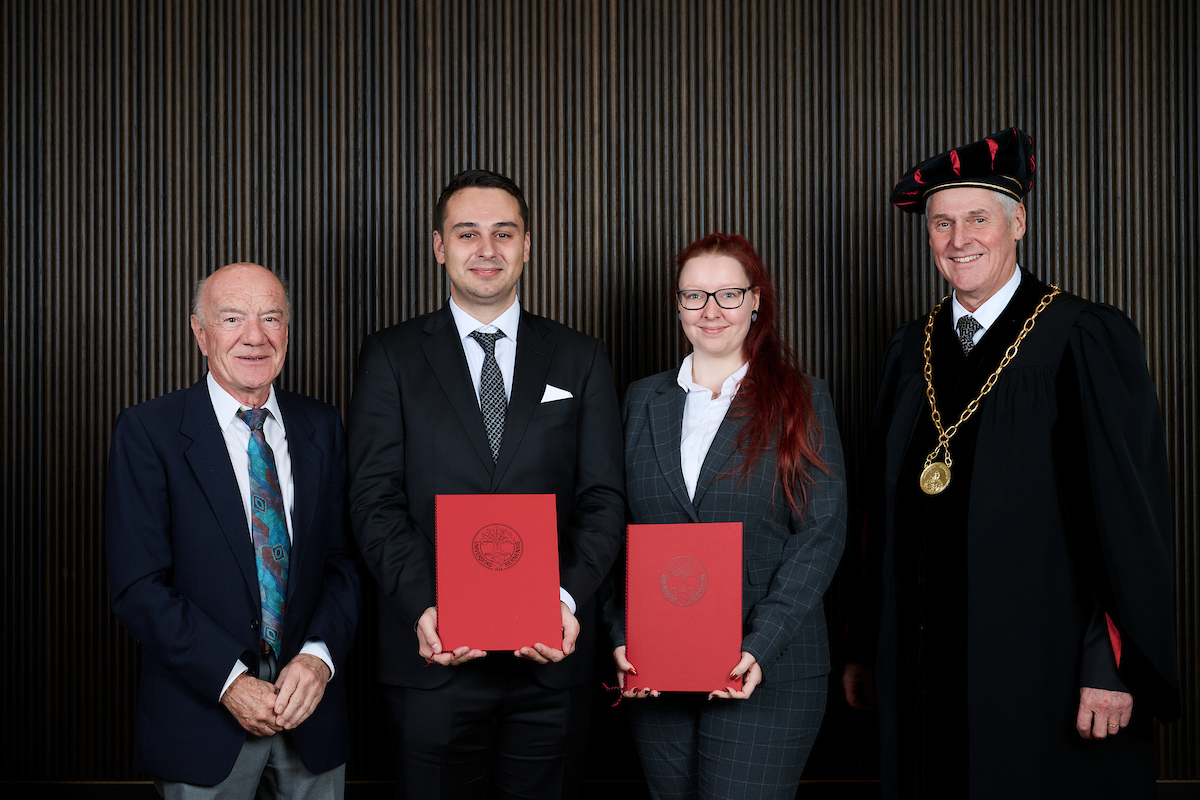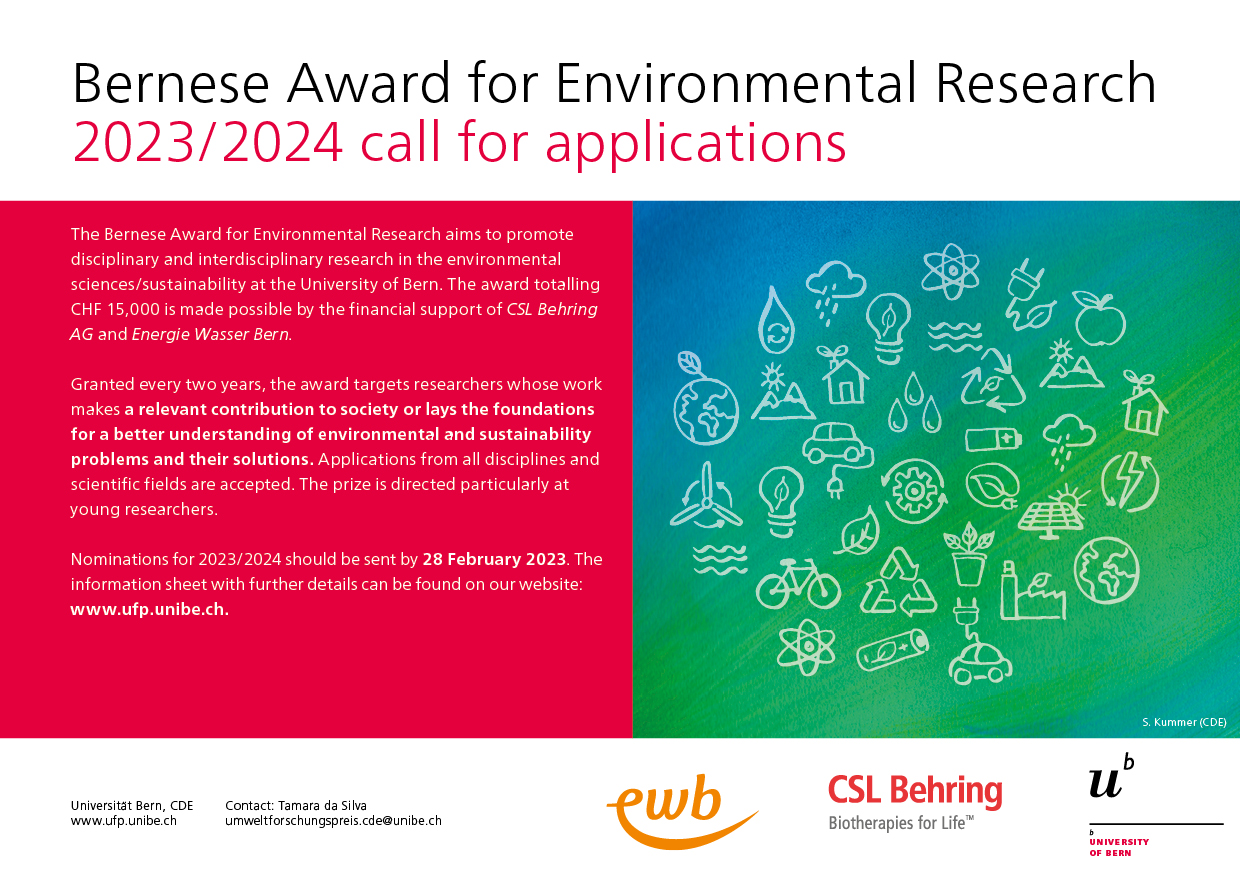Award 2023
The winners of the 14th Bernese Award for Environmental Research
Main Prize: Dr. Nicolas C.A. Lentz
The transition from fossil fuels to renewable energy sources is more urgent than ever, especially considering the threats posed by climate change and recent geopolitical developments. The hydrogen economy is a promising approach to reduce global reliance on fossil fuels and eliminate CO2 emissions, representing a centrepiece for sustainable energy production worldwide. An important factor is the safe storage and transport of hydrogen. Formic acid is the most promising liquid hydrogen carrier as it has a high energy density and can be recycled. However, its implementation will clearly depend on use of a suitable catalyst that enables the controlled release of hydrogen.
With his work, Nicolas Lentz demonstrates that formic acid is an exceptionally efficient catalyst that is key to realization of the hydrogen economy.
Recognition Award: Fabienne Wöhner
Reducing the volume of traffic is an important measure in the fight against climate change. About one third of Switzerland’s CO2 emissions are due to transportation. Meanwhile, increasing digitalization is making the labour market more flexible: A growing number of workers are able to do part of their job from home thanks to the internet. The question is whether this is leading to less commuting and thus reducing overall traffic. Ms. Wöhner’s work impressively ties in with current unresolved debates and uses statistical analyses to elegantly illustrate the rebound effect of traffic behaviour in Switzerland. She shows how social change, such as labour flexibilization, can have unanticipated consequences like more traffic for leisure and shopping. Her work thus provides important insights for environmental research on a highly relevant subject.
Nominations
We are delighted to announce that 13 exceptional works have been submitted for the 2023 prize.
We thank all nominees for the commitment.
| Name | Title |
|---|---|
| Becker, Jens |
Antimicrobial susceptibility in E. coli and Pasteurellaceae at the beginning and at the end of the fattening process in veal calves: Comparing ‘outdoor veal calf’ and conventional operations |
| Berger, Sebastian; Kilchenmann, Andreas; Lenz, Oliver, Schlöder, Francisco; Wyss, Annika | Large but diminishing effects of climate action nudges under rising costs |
| Fesenfeld, Lukas | Wege in die Ernährungszukunft der Schweiz - Leitfaden zu den grössten Hebeln und politischen Pfaden für ein nachhaltiges Ernährungssystem |
|
Gmür, Désirée |
Grabbing the female commons: Gendered outcomes of commons and resilience grabbing by large-scale land acquisitions for forest plantations in Kilolo district, Iringa region, Tanzania |
| Hildebrandt, Toni | The aporia of cinders and the aporetic structure of Hiroshima mon amour |
| Kluwick, Ursula | Victorian Water Writing. Liquid Ecologies |
| Lentz, Nicolas | A low-coordinate iridium complex with a donor-flexible O,N-ligand for highly efficient formic acid dehydrogenation |
| Rodenbücher, Anna | Pumpkin seeds, lemongrass essential oil and ripleaf leaves as feed additives for Ascaridia galli infected laying hens |
| Rodriguez Villamizar, Julian Camilo | Efficient Laser Ranging to Space Debris |
| Sengupta, Arunima | A multiplex inhalation platform to model in situ like aerosol delivery in a breathing lung-on-chip |
| Vignali, Sergio | A predictive flight-altitude model for avoiding future conflicts between an emblematic raptor and wind energy development in the Swiss Alps |
| Wiesli, Thea | Quality of Life and Sustainability in Rural Switzerland |
| Wöhner, Fabienne | Work flexibly, travel less? The impact of telework and flextime on mobility behavior in Switzerland |
2023 Bernese Award for Environmental Research
The Bernese Award for Environmental Research aims to promote disciplinary and interdisciplinary research in environmental sciences and sustainability at the University of Bern. The prize money in 2023 totals CHF 15,000.
The award, granted every two years, targets researchers whose work makes a relevant contribution to society or lays the foundations for a better understanding of environmental and sustainability problems and their solutions.


